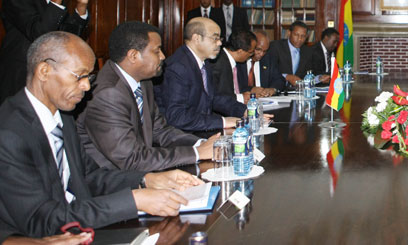Ethiopia’s Prime Minister Meles Zenawi contends that his government is aware of the pros and cons of employing protectionist measures but still intends to maintain its monopoly in industries such as telecommunications, power, finance and logistics with the aim of protecting its citizens against exploitation.
“This (protection) is not intended to keep away anybody and it is not based on paranoia. It has everything to do with creating a little bit of space for unemployed Ethiopian youth to learn to do business and accumulate a little bit of money,” he emphasised.
He argued that it was such government control that had enabled Ethiopia to make headways in the energy sector allowing it to generate thousands of megawatts of electricity, making the country a competitive destination for business.
The adoption of this mix of policies has also enabled the government to deliver an efficient railway system and telecommunications sector. No foreign banks operate in Ethiopia while the public banks have not been privatised.
“That is not going to be the future but we feel that at this phase of our development, we need these inputs,” he said in defence of his policies.
Zenawi who was in Kenya last week however said his country values Foreign Direct Flows as demonstrated by its desire to attract investments in manufacturing, agriculture and tourism sectors where government restrictions are minimal.
China, India and Turkey are the three top investors in his country.
“Manufacturing is 100 percent open and we will facilitate investment especially with access to land; assisting you with training of manpower; cheap electricity and we will try to make business as profitable as possible,” he disclosed.
Zenawi was responding to proposals by the country’s business community to fully liberalise his country’s economy so that it can play a bigger role in promoting intra regional trade.
Ethiopia’s largely nationalistic policies have been criticised with pundits arguing that such tendencies undermine the potential for growth and choke the investment spirit. The private sector is not as robust as in other countries.
His government however points to the sustained double digits economic growth that the country has enjoyed over the last decade, which has placed it among the strongest performing economies in Sub-Sahara Africa and one of the countries that are making good progress in reducing poverty levels.
But while citing the cordial bilateral ties that Ethiopia has shared with Kenya over the years, he expressed his willingness to address some of the concerns raised by the local private sector.
Through the Kenya Association of Manufacturers (KAM), the business community had voiced their concerns over for instance the infringement of trademarks of Kenyan established companies; the foreign equity ownership restrictions as well as the Ethiopian’s government directive that businesses have to use (Ethiopian) transporters or trucks for movement of goods into that country.
‘Ethiopian government needs to be sensitive to the development of its vibrant private sector. The resultant length of time to export or import is nearly 1.5 months and internal transport costs of more than $2,600 (Sh215, 800) for imports leads to high costs for consumers,” KAM Chairman Jes Bedi appealed.
Such obstacles are witnessed in nearly all other sectors, which KAM said frustrates their operations.
Despite being neighbours and having a lot in common, trade volumes between these two countries are still very low. Formal trade continues to grow at a snail’s pace although the ‘black market’ thrives.
In 2008 for instance, Kenya’s exports to Ethiopia were worth Sh4.4 billion but declined slightly in 2009 and 2010 to Sh4.31 billion and Sh4.38 billion respectively. Imports on the other hand were a meagre Sh201.3 million, Sh237.8 million and Sh76.4 million in 2008, 2009 and 2010 respectively.
Being one of the most populous nations in Africa, with 80 million people, the business community felt that Ethiopia can partner with Kenya to capture a bigger slice of the continent’s economic pie. This would only be possible, they pointed out, if Ethiopia is open for business.



































